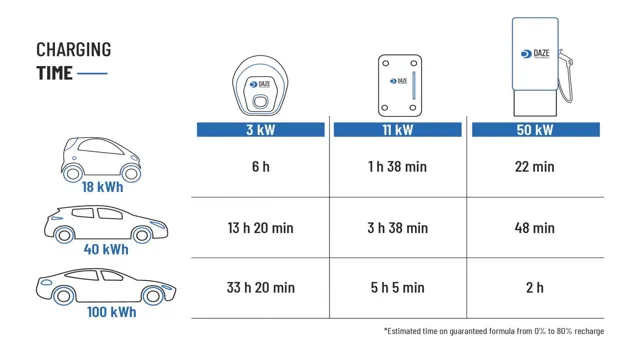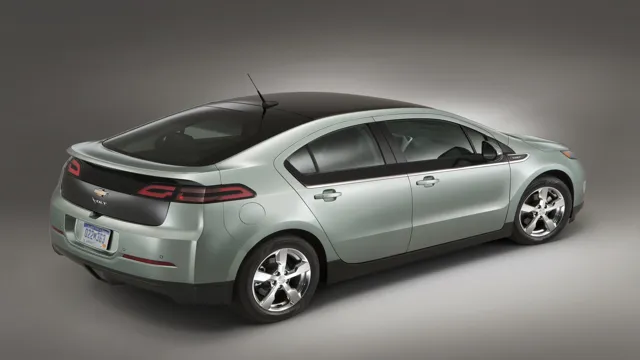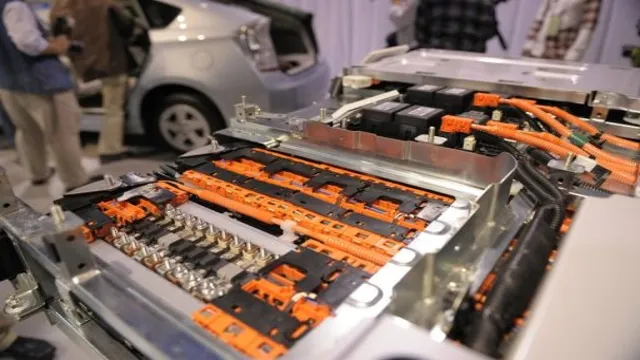Rev up your knowledge on Electric Car Battery Charging Time: A Comprehensive Guide
As electric cars become more popular, one of the biggest concerns people have is how long they take to charge. After all, many have grown accustomed to the quick refill times of traditional gas-powered vehicles and don’t want to waste precious time waiting for their EVs to charge up. But how long does it actually take to fully charge an electric car battery? The answer, as with most things in the EV world, is “it depends.
” In this blog, we’ll explore the facts and figures surrounding electric car battery charging times, including the factors that can affect it and how long you can expect to wait before hitting the road again. So buckle up and let’s take a closer look at this essential aspect of electric vehicle ownership.
Why Charging Time Matters
Electric car battery charging time is a crucial aspect to consider when purchasing an electric vehicle. The charging time determines how long you need to wait before you can get back on the road and dramatically impacts the convenience of driving an electric vehicle. A shorter charging time means less time spent sitting in the car while it charges, which is particularly important if you have long daily commutes or road trips planned.
On the other hand, a longer charging time can limit your ability to travel to more extended distances as you’ll have to factor in the time it takes to recharge. The electric car battery charging time also affects how you use your vehicle. If you can charge it quickly, you can choose to charge it more often or partially, which reduces the stress on the battery.
Ultimately, minimizing charging time is necessary to ensure that electric vehicles become more prevalent and practical for everyday use.
Electric Car Charging Basics
When it comes to electric car charging, the time it takes to charge your vehicle can have a significant impact on your day-to-day activities. Imagine needing to charge your car, but it takes hours to do so, leaving you stranded in a parking lot or unable to get to your destination on time. That’s why charging time matters, and it’s essential to consider this aspect when choosing an electric vehicle.
Some cars have faster charging abilities than others, so it’s crucial to do your research before making a purchase. Just like how a quick pit stop can make a significant difference in a race, a fast-charging electric vehicle can make a difference in your daily life by allowing you to get where you need to go more efficiently. So, if you’re in the market for an electric car, remember to consider charging time, and choose a vehicle that fits your lifestyle needs.

Factors That Affect Charging Time
Charging time is a significant factor to consider when it comes to our electronic devices, and the time it takes to recharge them can sometimes be frustrating. The time it takes for a device to charge depends on various factors, including the type of charger being used, the capacity of the battery being charged, and the type of device being charged. Fast chargers can charge devices much quicker than standard ones, but they can also generate more heat, which can damage the battery and reduce its lifespan.
It’s essential to choose the right charger for the specific device being charged to ensure maximum efficiency and longevity. The charging time also matters because it can impact our daily routine and productivity. It’s frustrating when our phone or laptop battery dies while we’re in the middle of an activity, and waiting for it to recharge can be a major inconvenience.
Therefore, it’s crucial to consider charging time when purchasing electronic devices and accessories.
Average Charging Times for Popular Electric Cars
When it comes to electric cars, charging time is an important factor to consider. On average, it takes around 4-6 hours to fully charge a mid-sized electric car with a 60 kWh battery using Level 2 charging stations. However, this charging time can vary depending on the make and model of the car, as well as the charging station used.
For example, a Tesla Model S can fully charge in as little as 1 hour using a Supercharger. Other electric cars such as the Nissan Leaf or the Chevy Bolt take around 7-8 hours to fully charge using Level 2 charging stations. Additionally, some newer electric cars are equipped with fast-charging capabilities that can shorten charging times significantly, but these charging stations are still relatively uncommon in many areas.
Despite these variations, one thing is clear: as electric car technology continues to grow and improve, the charging times for these vehicles will continue to decrease, making them even more practical for everyday use.
Tesla Model S
If you’re considering purchasing an electric car, one of the biggest concerns is the charging time. It’s understandable – nobody wants to be stranded waiting for their car to recharge. The Tesla Model S, however, offers some of the fastest charging times of any electric car on the market.
With a supercharger, you can charge up to 80% in just 40 minutes, which is perfect for a quick stop during a long road trip. And if you’re charging at home, you can expect a full charge in around 8-10 hours. Of course, charging times may vary depending on a number of factors, such as temperature and battery level, but the Model S boasts impressive charging speed nonetheless.
Plus, with the ability to track your charging progress through the car’s app, you can always stay in the know. All in all, the Tesla Model S is a great option for those concerned with charging time.
Nissan Leaf
The Nissan Leaf is a popular electric car that is known for its sleek design and eco-friendly features. One of the most important things to consider when it comes to electric cars is their charging time. How long does it take for the car to recharge, and how does that compare to other electric vehicles? The average charging time for the Nissan Leaf is about 8 hours, which is pretty standard for most electric cars.
Of course, this can vary depending on the particular model and charging station used. Some newer models of the Nissan Leaf have a faster charging time, taking only 4 hours to reach a full charge. It’s always a good idea to do your research and ensure you have a charging plan in place when considering purchasing an electric car.
Chevrolet Bolt
The Chevrolet Bolt has quickly become a popular electric car option, but one aspect that concerns potential buyers is the charging time. On average, it takes the Bolt about 5 hours to fully charge using a level 2 charging station.
However, this time can vary depending on several factors, such as the age of the car’s battery and the strength of the charging station. If you’re on a road trip and need a quick boost, the Bolt can charge up to 90 miles in just 30 minutes using a DC fast-charging station. Overall, the Bolt’s charging time is relatively average compared to other electric cars on the market.
With proper planning and access to charging stations, it’s definitely possible to make the most of this eco-friendly car without sacrificing convenience.
Fast Charging vs. Slow Charging: What’s the Difference?
When it comes to charging your electric car battery, there are two options: fast charging and slow charging. Fast charging typically uses high-voltage charging stations that can charge your battery up to 80% in 30 minutes or less, while slow charging can take several hours to fully charge your battery. The main advantage of fast charging is convenience; it enables you to quickly top off your battery on longer trips or when you’re short on time.
However, fast charging can also be more expensive and may not be as good for your battery’s long-term health. Slow charging, on the other hand, is typically less expensive and gentler on your battery, which can maximize its lifespan. Additionally, many electric car owners find that slow charging is more convenient for daily charging at home or work since they can simply plug in their car overnight or while they’re at the office.
Ultimately, the right choice depends on your specific needs and preferences, and you should consult your car’s user manual for recommendations on charging times and methods.
Level 1 Charging
Level 1 Charging When it comes to charging your electric vehicle, you have two options: fast charging and slow charging. Level 1 charging, also known as slow charging, is the most basic form of charging available for EVs. This level of charging requires a standard 120-volt household outlet and a charging cable that typically comes with your EV.
While it’s convenient and easy to use, Level 1 charging is much slower than fast charging. In fact, it can take anywhere from 8-12 hours to fully charge your EV using Level 1 charging. However, if you have a short commute or don’t use your EV very often, Level 1 charging may be all you need.
Plus, it’s a much more affordable option compared to fast charging, as there are no additional costs for installing special charging equipment. Overall, Level 1 charging is a great option for those looking for a simple and affordable way to charge their EV.
Level 2 Charging
Level 2 charging is a type of EV charging that is often referred to as slow or fast charging, depending on your perspective. Compared to Level 1 charging, which uses a standard 120-volt outlet and takes hours to complete, Level 2 charging provides a faster and more convenient charging experience. It uses a 240-volt AC power outlet and delivers between 20 and 60 miles of range per hour of charging, depending on the vehicle and charger.
Level 2 chargers are commonly found in public charging stations and are often used to top up EV batteries while running errands or grabbing lunch. While they are not as fast as Level 3 charging stations, which can charge many EVs in less than an hour, they are still considerably faster than Level 1 charging and provide a convenient option for those who do not need to charge their EVs quickly. The main advantage of Level 2 charging is that it strikes the right balance between charging speed and convenience, making it an ideal choice for most EV drivers.
Tips for Reducing Charging Time and Maximizing Your Range
For electric car owners, charging time and range can be a major concern. To ease those worries, there are a few tips to maximize your car’s range and reduce charging time. Firstly, try to limit rapid acceleration and heavy braking as much as possible.
This not only conserves energy but also puts less strain on the battery. Secondly, consider using a Level 2 charging station at home rather than a Level 1, which takes longer to charge. Another helpful tip is to charge your car at off-peak times to potentially lower the cost of electricity.
Finally, keep in mind that frequent charging to “top off” the battery can actually shorten its lifespan, so it’s better to charge before reaching a critical level. By following these tips, you can spend less time charging and more time enjoying your electric vehicle’s optimal range.
Conclusion
In the world of electric cars, charging time can make or break your trip. But fear not, my dear reader! With advancements in battery technology and charging infrastructure, the time it takes to juice up is decreasing faster than a battery draining in a Tesla drag race. So, whether you’re road-tripping or simply commuting to work, know that the future of EVs is bright, swift, and electrifying.
“
FAQs
What factors affect the charging time of an electric car battery?
The charging speed of an electric car battery can be affected by several factors, including the type of charging station, the capacity of the battery, and the age of the battery.
How long does it typically take to charge an electric car battery?
The charging time for an electric car battery can vary depending on the type of charger used and the capacity of the battery. On average, it can take anywhere from 30 minutes to several hours to fully charge an electric car battery.
Can you charge an electric car battery at home?
Yes, it is possible to charge an electric car battery at home using a dedicated charging station or a standard 120V household outlet. However, the charging time may be slower compared to using a fast-charging station.
Are there any risks associated with charging an electric car battery?
While charging an electric car battery is generally safe, there are some risks to be aware of, such as potential electric shock or fire hazards if not done properly. It is important to follow manufacturer guidelines and use certified charging equipment to minimize these risks.




